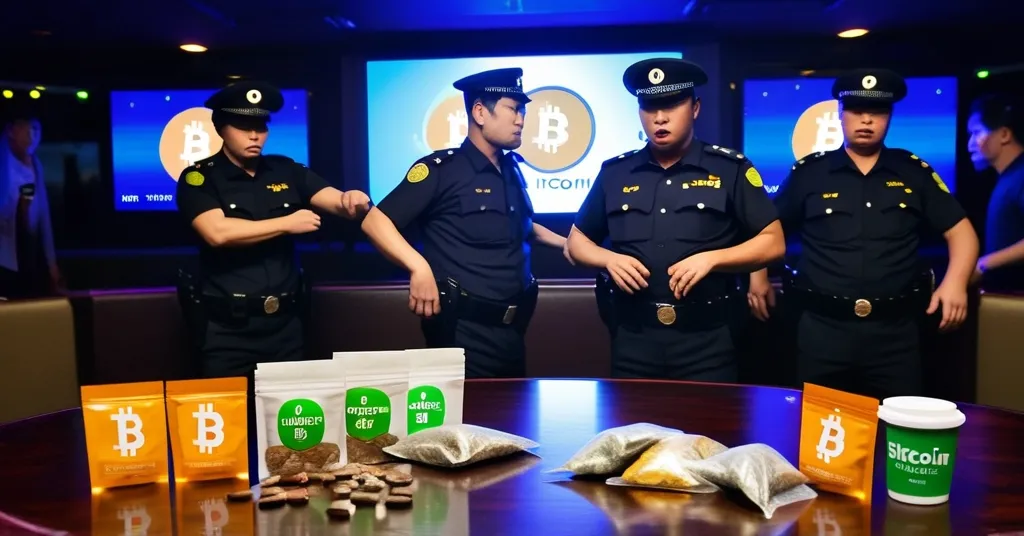South Korea Busts Bitcoin-Funded Drug Ring, 90 Arrested

South Korea’s Major Drug Bust Targets Cryptocurrency-Funded Gang
In a dramatic sweep across South Korea, police have dismantled a sophisticated drug network, arresting 90 Vietnamese nationals who used Bitcoin to fuel their operations. The gang smuggled synthetic cannabis, ketamine, and MDMA, cleverly disguised as everyday items.
- 90 Vietnamese nationals arrested in South Korea.
- Drugs smuggled and sold using Bitcoin.
- Social media platforms like X and Telegram used for advertising.
- Part of a broader effort to combat crypto-powered drug crimes.
The Operation Details
South Korean law enforcement conducted an extensive operation targeting nine Vietnamese-run bars and clubs in cities such as Sejong, Daegu, Cheonan, Asan, and Jincheon. The crackdown resulted in the arrest of 90 Vietnamese nationals suspected of running a drug trafficking network across the country. The gang was found to be smuggling and distributing drugs like synthetic cannabis, ketamine, and MDMA, with the narcotics cleverly disguised as packets of coffee and vitamins. The operation uncovered that the gang had smuggled drugs worth an estimated 1.04 billion won ($721,000) into South Korea, with sales amounting to about 710 million won ($497,000). Out of the 90 arrested, 18 were remanded in custody, and authorities plan further arrests, particularly targeting intermediaries through digital analysis, which involves tracking cryptocurrency transactions and digital communications.
Cryptocurrency and Anonymity
Cryptocurrencies like Bitcoin allow for transactions without revealing the buyer’s or seller’s identity, making them attractive for illegal activities. In this case, the gang used Bitcoin to facilitate their drug sales, leveraging the anonymity the cryptocurrency provides. While cryptocurrencies can enable illegal activities, they also offer significant potential for financial inclusion and privacy. Advocates of decentralization and financial freedom must acknowledge these challenges while continuing to champion the revolutionary aspects of these technologies. The fight against such crimes should inform our approach to ensuring their use in a safe and responsible manner.
However, it’s no bullshit—cryptocurrencies are a double-edged sword. They empower individuals with financial freedom and privacy but also enable new forms of criminal activity. It turns out, the ‘crypto’ in cryptocurrency isn’t just about the cool tech; it’s also about keeping things undercover.
The Role of Social Media
The rise of such criminal activities has been further fueled by the use of social media platforms like X and Telegram. Drug dealers use these platforms to advertise nationwide delivery services, accepting Bitcoin payments. The anonymity and ease of communication on these platforms make them ideal for illegal activities. Features like encrypted messaging and the ability to reach a wide audience quickly have made social media a vital tool for drug trafficking networks.
Recent posts on X and Telegram show drug dealers openly offering nationwide delivery services, accepting Bitcoin payments. This digital shift poses new challenges for law enforcement, requiring them to adapt their strategies to tackle crimes that are increasingly moving online.
Global Trends and Responses
South Korea’s battle against crypto-related drug trafficking is part of a global trend where law enforcement agencies are struggling to keep up with the use of digital currencies in illegal activities. According to Chainalysis, 2024 saw a reported $40.9 billion in illicit cryptocurrency transactions, with estimates suggesting this could rise to over $51 billion. The increasing professionalization and diversification of crypto crime, including the use of stablecoins, which now comprise 63% of all illicit transactions, highlight the need for a coordinated international response.
South Korea is actively working on both advancing its cryptocurrency market, with initiatives like ETF approvals, and cracking down on illicit activities. This dual approach underscores the complexity of the crypto environment in South Korea. The country has declared a “total war” on crypto-related drug trafficking, with President Yoon Suk-yeol emphasizing the need for thorough management of drug smuggling via international mail and express cargo at Incheon Airport.
Some argue that the focus on cryptocurrency in drug trafficking overshadows the more significant issue of demand, which needs addressing at a societal level. While cryptocurrencies are a tool used in these crimes, the root cause lies in the societal demand for drugs, which must be addressed through education and prevention efforts.
Key Takeaways and Questions
- What was the scale of the operation conducted by the South Korean police?
The operation resulted in the arrest of 90 Vietnamese nationals across nine bars and clubs in multiple cities.
- What types of drugs were involved in the trafficking network?
The gang allegedly sold synthetic cannabis, ketamine, and MDMA (ecstasy).
- How did the gang use cryptocurrencies in their operations?
They used cryptocurrencies as a payment tool to sell, smuggle, and source the drugs, leveraging the anonymity offered by Bitcoin.
- What methods did the gang use to smuggle drugs into South Korea?
The drugs were disguised as packets of coffee and vitamins.
- What is the broader context of this crackdown?
It is part of a larger effort to combat a rising epidemic of crypto-powered drug crimes in South Korea.
- What are the future plans of the South Korean police in response to this issue?
They plan to conduct regular crackdowns on entertainment venues frequented by foreign nationals and arrest more intermediaries through digital analysis, which involves tracking cryptocurrency transactions and digital communications.
- How are drug dealers leveraging social media in South Korea?
Drug dealers are using platforms like X and Telegram to advertise nationwide drug delivery services, accepting Bitcoin payments.
“Our crackdown will help prevent the spread of drugs and drug abuse.”



